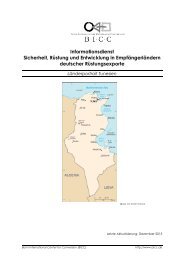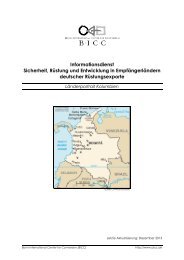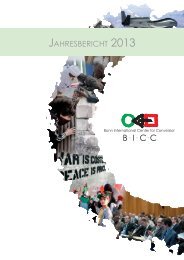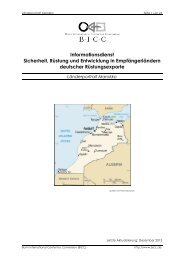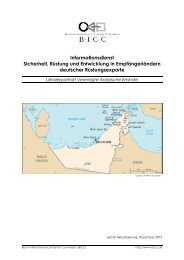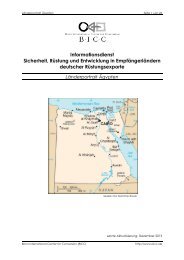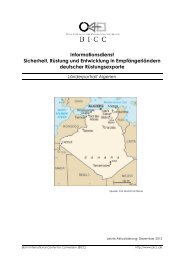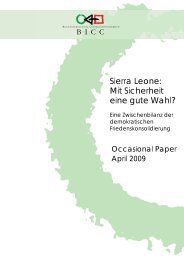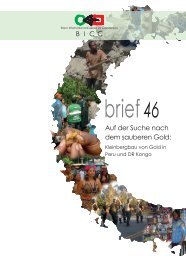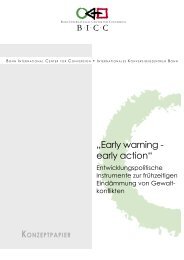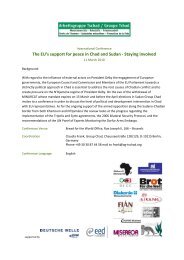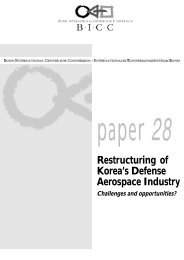English - BICC
English - BICC
English - BICC
You also want an ePaper? Increase the reach of your titles
YUMPU automatically turns print PDFs into web optimized ePapers that Google loves.
government also indicated its support<br />
for the suspension of devolved<br />
government if there was any failure to<br />
implement the Agreement (Irish Times,<br />
24 November 1999).<br />
The second safety net involved the<br />
UUP’s own capacity to set terms.<br />
Trimble was aware of Unionist<br />
concerns about an “open ended<br />
[decommissioning] process, where you<br />
get sucked along and get hung out to<br />
dry” (Irish Times, 26 November 1999)<br />
and prepared accordingly. Trimble<br />
successfully sold the notion of entering<br />
government before arms<br />
decommissioning to his party’s ruling<br />
body, the Ulster Unionist Council<br />
(UUC), in late November.<br />
The deciding factor seems to have<br />
been post-dated resignation letters<br />
Trimble had drafted in which he and<br />
other prospective UUP ministers<br />
promised to vacate the Executive if no<br />
IRA decommissioning had occurred by<br />
the end of January (Irish Times, 29<br />
November 1999). Only 58 percent of<br />
UUC delegates had supported this<br />
change from the ‘no guns, no<br />
government policy’ and it was evident<br />
that a deep fissure was running<br />
through Ulster Unionism, despite<br />
Trimble’s expectation that disarmament<br />
would follow devolution “as night<br />
follows day” (Irish Times, 27 November<br />
1999).<br />
Of course, Republicanism bridled at<br />
these “safety nets”; in their view the<br />
Agreement made no mention of<br />
default mechanisms such as the British<br />
were now legislating for, whilst<br />
Trimble’s resignation letter merely<br />
introduced a unilateral deadline which<br />
sought to “dictate and totally<br />
undermine and contradict” the agreed<br />
role of the IICD (Irish Times, 17<br />
November 1999).<br />
2 December:<br />
Devolution—Finally<br />
The fissures within the UUP, and<br />
Republican disquiet at the measures<br />
taken to minimise this fracturing, were<br />
disturbing portents of the future. This<br />
did not however stop the setting up of<br />
an executive on the 2 December.<br />
Northern Ireland now had a powersharing<br />
government comprising Ulster<br />
Unionist, SDLP, DUP and Sinn Fein<br />
ministers. The North-South crossborder<br />
bodies and the rescinding of<br />
Ireland’s territorial claim to the North<br />
quickly followed. The UFF (Ulster<br />
Freedom Fighters) nominated a<br />
representative to the IICD on 8<br />
December.<br />
There was a general air of euphoria as<br />
the Agreement was quickly<br />
implemented, but there may also have<br />
been a sense of unreality. Each of the<br />
parties in the Executive had rather<br />
different views on how<br />
decommissioning should best be<br />
pursued, and this was a question on<br />
which the sustainability of the<br />
Executive appeared to rest. Moreover,<br />
the increasing vulnerability of the UUP<br />
meant that an answer would need to be<br />
found quickly.<br />
Suspending the<br />
Agreement: January–<br />
February 2000<br />
Although the institutions of the<br />
Agreement were up and running, they<br />
existed under a Damoclean sword.<br />
Ulster Unionist Party Assembly<br />
members warned that they had<br />
“stretched [their] constituency to<br />
breaking point” and that a peace<br />
process without decommissioning was<br />
not worth “a penny candle” (Statement<br />
by the UUP, 1 February 2000, http://<br />
cain.ulst.ac.uk).<br />
B·I·C·C<br />
guns and government<br />
Republicanism appeared to remain<br />
unmoved. Adams felt that the<br />
decommissioning crisis was merely a<br />
case of “tactical manoeuvring” by the “<br />
‘No’ men of Unionism” who were<br />
engaged in a “clumsy attempt” to<br />
inflict a defeat on Republicans. The<br />
Sinn Fein leader stressed that nobody<br />
should doubt that Republicanism had<br />
already stretched itself considerably in<br />
reaching out to Unionists, as the<br />
ending of abstentionism had been an<br />
“unprecedented decision” by<br />
Republicanism. Unionism would<br />
simply have to be “patient” in waiting<br />
for decommissioning.<br />
Adams emphasised that there had been<br />
a “clear understanding” in the Review<br />
that Sinn Fein could not deliver<br />
disarmament in the terms now being<br />
demanded by Unionists. Instead, the<br />
Republican analysis was that<br />
decommissioning should be handled in<br />
a “mechanism . . . outside the political<br />
process”, in other words the IICD<br />
(Irish News, 28 January 2000). In<br />
attempting to separate politics from<br />
disarmament, they were hoping to<br />
remove a powerful irritant.<br />
The Unionists’<br />
resignation deadline<br />
The trouble was that, for the UUP,<br />
decommissioning was fundamentally<br />
political. It touched on questions of<br />
political principle and affected political<br />
considerations in relation to electoral<br />
competition with other Unionist<br />
parties. Most pressingly,<br />
decommissioning had struck deep into<br />
the internal politics of the party<br />
creating cracks and fissures.<br />
Consequently, and as Trimble made<br />
clear, “the formation of the Executive<br />
without a start to actual<br />
decommissioning was an unsustainable<br />
position in all but the short term.” Sinn<br />
39



